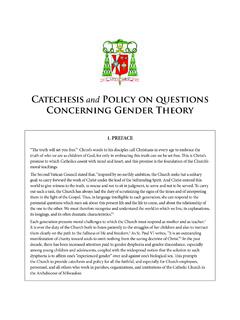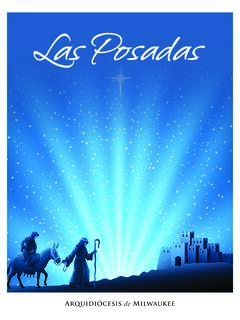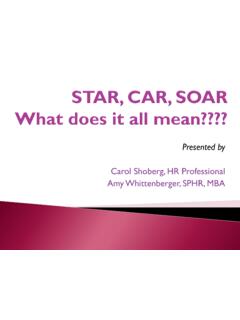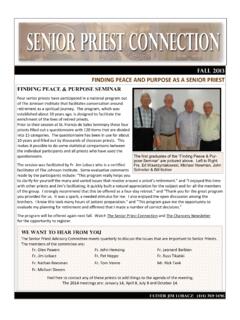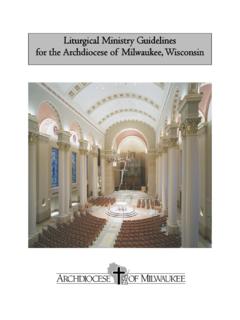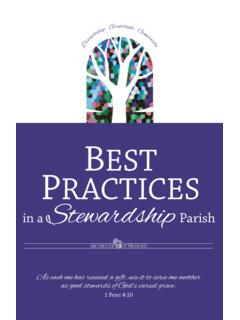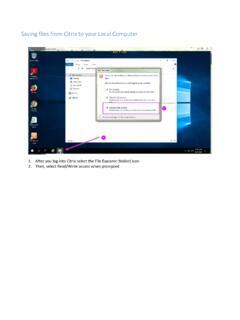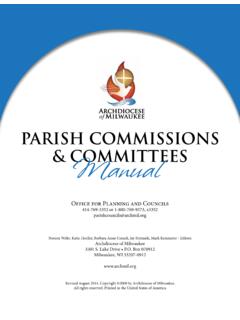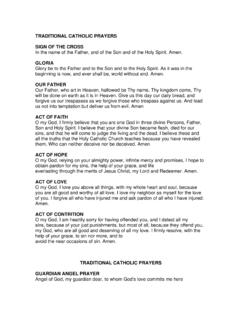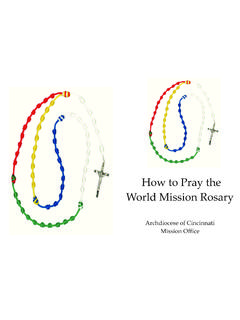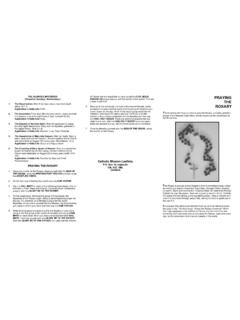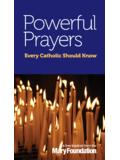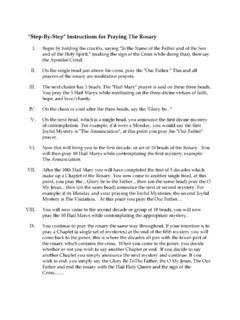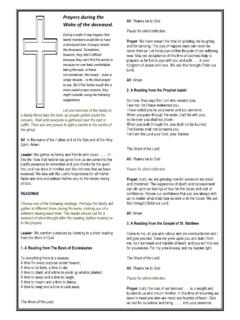Transcription of CATHOLIC FUNERALS - Archmil.org
1 CATHOLIC . FUNERALS . FREQUENTLY. ASKED. QUESTIONS. As you begin to prepare your own funeral or plan for the funeral of a loved one, the information found in this pamphlet will be helpful to you. Just as your CATHOLIC faith has guided you through life, it will support and guide you in preparing to embrace death. Additional information on these topics may be obtained by consulting the Sacramental Guidelines of the Archdiocese of Milwaukee or by calling the archdiocesan Chancery Office. 1 Where is the basic understanding and theology of CATHOLIC FUNERALS to be found?
2 The Order of Christian FUNERALS , published in 1989, contains a clear theology of the attitude of the CATHOLIC Church toward life after death and thus the respect the Church has for the human person, body and soul. An appendix to this ritual on cremation was published in 1997. The use of both is mandated in the United States. 2 How is respect to be shown to the deceased? The body of the deceased is to be buried (interment) or entombed in a mausoleum (entombment). These practices demonstrate Christian faith in awaiting the resurrection. (Cremation is covered later, in a separate section.)
3 3 May Catholics who have been divorced and remarried outside the Church or who have committed suicide be buried with a CATHOLIC ceremony? Yes. Such circumstances of themselves do not exclude the possibility of a CATHOLIC burial. In individual cases the Chancery Office of the archdiocese should be consulted. OVERVIEW OF CHRISTIAN funeral RITES. 4 How many parts make up the funeral rites? There are three main parts: 1) the Vigil, 2) the funeral Liturgy (with or without Mass) and 3) the Rite of Committal. Besides these, other rites are provided, , prayers just after death, prayers for gathering in the presence of the body at the beginning of a visitation, and prayers for transferring the body to the church.
4 5 Must funeral rites be led by priests? The ritual of the CATHOLIC Church allows for priests or deacons, to conduct the various services including the Vigil, a funeral Liturgy apart from a funeral Mass, and the Rite of Committal. Lay leaders of prayer may conduct the Vigil and the Rite of Committal. 1. CATHOLIC FUNERALS : Frequently Asked Questions 6 How best can families prepare for these rites? Family and friends may and should actively participate in planning these rites. Such working together can aid in the grieving process. There are many options in the rituals that provide for a variety of approaches.
5 The final wishes of the deceased are to be respected to the extent possible. 7 May any of the rites be omitted? Since the three rites flow one into another and provide a time of consolation for family members and friends through the liturgy, it seems best to use all three rites. PRAYERS AFTER DEATH. 8 When should the parish be notified? The parish priest should be notified of a death as soon as possible. He or another parish minister can then meet with the family and pray for the repose of the newly deceased. Gathering in the Presence of the Body 9 When is this gathering to be held?
6 As the family gathers at the funeral home or in the church for the first viewing of the body, it is appropriate to say the ritual prayers. It is also a time of quiet prayer and reflection. THE VIGIL. 10 What is the difference between a Vigil and a visitation? A visitation is simply a gathering of friends who wish to view or be present with the remains of the deceased, console the relatives, reminisce about the past, and share stories of the deceased. A Vigil is the prayer designated in the Ritual and held during a visitation. The Vigil ought not to be held apart from the visitation, preventing the participation of those visiting the family.
7 Should a visitation in church immediately precede a funeral Mass, the Vigil is not used. 11 Where should a Vigil be held? The Order of Christian FUNERALS allows for the Vigil to be held in various places. It can be held in the home of the deceased, in a funeral home, in a nursing home, or in the parish church, but not directly preceding the Mass. 12 Are the recitation of the rosary and other wake prayer services permitted? The Vigil is the official prayer designated by the Church for this occasion and is found in the Order of Christian FUNERALS . It includes prayers for the deceased and recognizes the person's Christian life.
8 The recita- tion of the rosary and other private devotions are permitted but should be held at a time other than the Vigil and should never take the place of the official Vigil. 13 What opportunities are present to share memories? The Vigil and the visitation are appropriate times for family and friends to share stories and remembrances of the deceased. The Vigil ought to be scheduled at a time when friends and acquaintances can attend. THE funeral LITURGY. 14 When may funeral Masses be celebrated? Generally, funeral Masses are celebrated on weekdays, at a time when most people can attend.
9 The funeral Mass may be celebrated on any day except Sundays, Holy Days, and the Easter Triduum (Holy Thursday, Good Friday, and Holy Saturday). Sunday evening is often considered an anticipation of Monday, and thus a funeral Mass can be permitted by the individual pastor at that time. On days when a funeral Mass is not permitted, the body may be brought to the church for a prayer service. At a suitable time later, a memorial Mass may be celebrated. It is important for families to be in contact with the parish as to the time of a funer- al Mass before completing these arrangements with funeral directors for publication.
10 2. CATHOLIC FUNERALS : Frequently Asked Questions 15 What is the preferred site for a funeral Mass? The preferred site for a funeral Mass is a parish church. The use of chapels and oratories is not permitted for the funeral Mass. An exception can be made for CATHOLIC nursing homes that have a permanent chapel if the deceased had been a longtime resident there. The pastor of the home parish should be informed of these plans. 16 Which church is most appropriate for a funeral Mass? The home parish church of the deceased is the most appropriate church for the funeral Mass because the parish has the obligation to care for its members.
